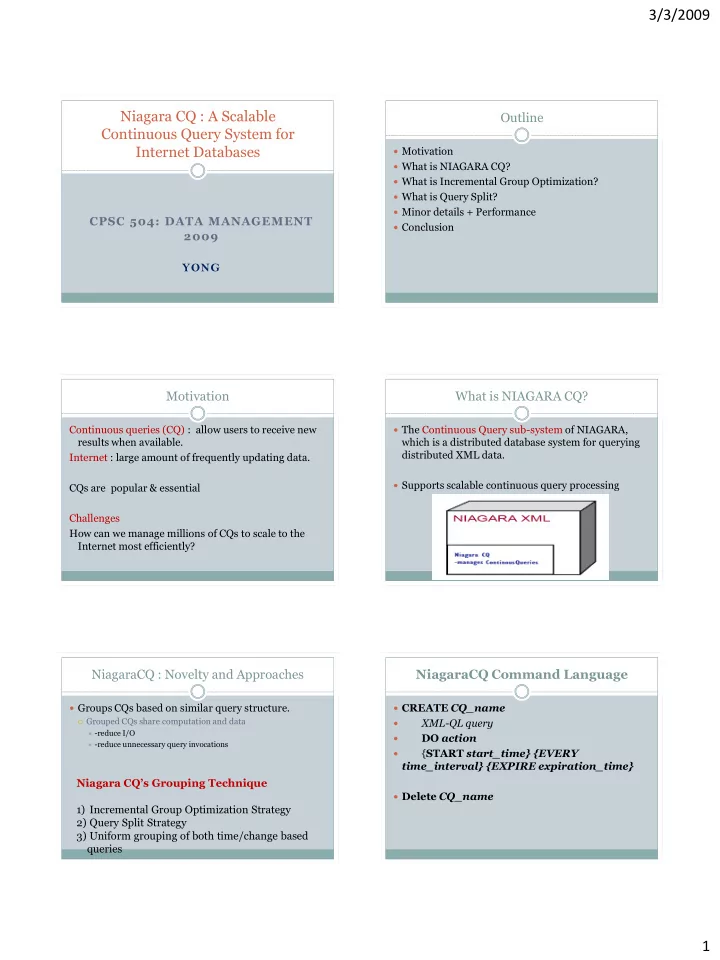

3/3/2009 Niagara CQ : A Scalable Outline Continuous Query System for Internet Databases Motivation What is NIAGARA CQ? What is Incremental Group Optimization? What is Query Split? Minor details + Performance CPSC 504: DATA MANAGEMENT Conclusion 2009 YONG Motivation What is NIAGARA CQ? Continuous queries (CQ) : allow users to receive new The Continuous Query sub-system of NIAGARA, results when available. which is a distributed database system for querying distributed XML data. Internet : large amount of frequently updating data. Supports scalable continuous query processing CQs are popular & essential Challenges How can we manage millions of CQs to scale to the Internet most efficiently? NiagaraCQ : Novelty and Approaches NiagaraCQ Command Language Groups CQs based on similar query structure. CREATE CQ_name Grouped CQs share computation and data XML-QL query -reduce I/O DO action -reduce unnecessary query invocations { START start_time} {EVERY time_interval} {EXPIRE expiration_time} Niagara CQ’s Grouping Technique Delete CQ_name 1) Incremental Group Optimization Strategy 2) Query Split Strategy 3) Uniform grouping of both time/change based queries 1
3/3/2009 Incremental Group Optimization Strategy Incremental Group Optimization Strategy Groups are created for existing queries according to their signatures How do you group these Signatures= similar structures among the queries continuous queries Groups allows the ‘common parts’ of queries to be shared most efficiently???? Common parts share result data from the ‘Group Plan’ New query is merged into those existing groups that match its signatures. Expression Signature Group Represent the same syntax structure, but possibly different Groups are created for queries based on their constant values, in different queries. expression signatures. Consists of 3 parts: Expression signatures allow queries with the same syntactic structure to be grouped together to share computation Group signature : The common expression signature of all queries in the group. Group constant table : The group constant table contains the signature constants of all queries in the group. Group (cont.) Group (cont.) Group plan: the group plan is the query plan shared by all queries in the group. It is derived from the common part of all single query plans in the group. 2
3/3/2009 Incremental Grouping Algorithm Discussion Expression signatures as described here are a very simple transformation. Are they too simple? That is, When a new query is do they group together enough of the kinds of submitted: queries that this system is meant to handle? Group optimizer traverses query plan bottom up to match its Do you think they would work better or worse for expression signature SQL queries instead of XML? with the signatures of existing groups. If no match, a new group will be generated. Query Split Strategy Pipeline buffer How do we implement the destination buffer for ‘split 1) Timer- based CQ… which tuple to store and for operator’? how long? 2) results in a single execution plan for all queries in the group -the query structure is a directed graph thus the plan may be too complicated 1)Pipeline (BAD) -The combined plan can be very large -A large portion of the query plan may not need to be executed 2)Intermediate file (GOOD) at each query invocation -Bottleneck Materialized Intermediate Files Materialized Intermediate Files (cont.) Advantages Each query is scheduled independently. The potential bottleneck problem of the pipelined approach is avoided. Disadvantages Extra disk I/Os. Split operator becomes a blocking operator. 3
3/3/2009 Some performance comparisons Other details Timer-based continuous queries fires at specific times, but only if the corresponding input files have been modified. Incremental evaluation allows queries to be invoked only on the changed data = ‘ delta file ’ Conclusion Discussion The authors motivate Niagara with a simple stock quote monitoring application. Is Niagara the best NIAGARA CQ : way to support this particular application? What Incremental Group Optimization with Query Split other kinds of applications would Niagara be appropriate for? -scalable -works better than non-groupings -requires minimal change in query engine 4
Recommend
More recommend